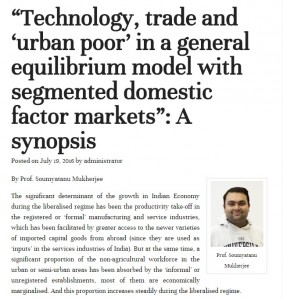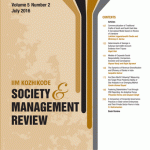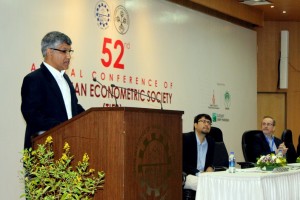2nd Pan IIM World Management Conference at IIMK: The flipside of globalizing Indian thought — let’s forget about Jugaad
By Prof. Naveen Amblee
There is an incomplete understanding of the motto “Globalizing Indian Thought”, in that most scholars see it solely as a mission to take Indian-born ideas and ideals to a broader global audience. This is certainly part of the concept, and a noble one. However there is another side to this coin, one that is much more important at this stage of our economic growth. This involves globalizing the thought of Indians. This aspect has been overlooked in our well-meaning but misconceived rush to contribute to global society, most notoriously through Jugaad.
‘Jugaad’ or frugal innovation, is the use of limited resources to create new products and services, usually at below global standards. While these may be well intentioned, they arise from the erroneous premise that innovation always means something completely new, rather than something different, and thereby excludes existing technologies or processes that are ‘new-to-us’. By restricting the definition of innovation to only the completely new, and given the inability of developing countries such as India to invest heavily in R&D, it then logically leads to the extolling of frugal innovation. However this approach completely disregards the most successful form of innovation today, which is doing something that is new to the beneficiaries of the process or technology, even though the technology may have been invented and deployed decades ago elsewhere.
Thus while frugal innovations are well intentioned, superior global alternatives to these frugal innovations already exist and if implemented via a broader perspective on innovation, could rapidly propel the poor into the middle class, in a way that jugaad innovation, by its very nature, cannot. In addition, there are no takers for these products anywhere in the modern world. In other words, there is no global demand for our current thoughts – at least ones on management and production that emphasize lack, scarcity and poor quality. When it comes to wealth (all forms, material, environmental, social), one wants to learn from the most successful. No one wants to ask a less than well-to-do person the secret to his or her success. The same goes for nations as well. We do of course have a leadership position in some aspects such as yoga and Ayurveda, and these are indeed glorious and a source of immense pride, and we have made great contributions to global welfare with these thoughts, but none of these really fall under management practices.
The problem is our insistence on taking our thoughts global immediately instead of globalizing our thoughts first. The next two decades should be a period of absorbing and implementing global ideas, with a minimal insistence on the generation and dissemination of home grown ideas. Of course if they occur naturally, so be it. But if superior ideas exist elsewhere, there is no point in reinventing the wheel. The plain fact is that there are no takers for our “Jugaad” ideas. There may be accolades and awards, and write-ups in leading publications, but no-one wants these products in their homes or cities. These is simply no market for these ideas and products.
Let me illustrate with two examples. The first involves the poster child of frugal innovation – the Tata Nano, which is now widely perceived as a complete disaster, although this should have surprised no one. By innovating frugally (i.e. taking shortcuts on well-established production techniques such as gluing parts instead of welding them), the resulting product was substandard in almost every aspect to every vehicle on the road. Yet there is perhaps no car in history since Ford’s Model-T to receive the kind of global publicity and praise that the Nano received before launch. Accolades don’t matter. What matters is the product – it was a jugaad product that no one in India wanted, much less the rest of the world. In other words, no one (not even Indians) wanted our thoughts on Jugaad car-making because they are not world class thoughts.
Now it does not by any means preclude leading Indian car makers like Maruti contributing to global management techniques, but these will be much more nuanced and definitely not Jugaad in nature. We can and are making world class cars in India, often at a lower cost than in other countries. But these are not the result of frugal innovation – cost differences are largely due to lower labor costs, although these are often offset by higher costs in other areas of doing business – areas where Jugaad is in full swing (electricity, logistics, etc).
The second example (or rather counterexample) involves the mobile telecommunications industry in India. In just a decade and a half, we have gone from having one of the lousiest telecom infrastructures to one of the best in the world, with a tele-density of 75% from nearly zero. This was achieved by replicating world-class technologies in all areas of the industry. We used GSM technologies and standards, leaving us with a mobile telecom infrastructure that is comparable and compatible with the rest of the world. We have a system where our handsets work globally, and vice versa, and communication across borders is seamless. A new phone developed in Beijing can be used immediately in Bangalore, and an Android app created in Bangalore can be used in Helsinki. One shudders at the thought of the state of our telecommunications if we had adopted a Jugaad mobile infrastructure driven by frugal innovation, incompatible and unwanted by the global communications industry.
So what is the solution? The solution is to globalize our thinking, in much the same way the Chinese are doing now, and what the Koreans and Taiwanese did before them, and what the Japanese did before them. We need to globalize our thoughts and absorb the best and latest ideas, concepts, processes, procedures, and technologies. Once we are at par with the rest of the world, we can focus on taking our leading thoughts global. In practical terms this means building world class infrastructure that allows firms to utilize our large labor pool to produce in scale, creating quality products at a cost that is affordable to all. Frugal innovation has no role to play.
In fact we have globalized Indian thought very successfully within the IT industry, where we first replicated the best practices and technologies globally (global standards of computing equipment, software, operating systems, networks, processes and procedures – everything down to the quality and design of office buildings and cubicles), and then started contributing globally with great success. The first step is always to become par with the rest of the world, and then to reach further, which becomes our contribution to global thinking – globalizing Indian thought.
Let me be clear – this does by any means involve abandoning cherished Indian values – just the opposite. By adopting the best global practices, we will allow our best values to shine brightly to the rest of the world. The Japanese are the best example of this, and should serve as a great source of inspiration to us.
For academics like us, it is akin to writing one’s doctoral dissertation. The first step is to do a complete literature review – an exhaustive process where one reviews and absorbs all the accumulated global knowledge on a particular topic, and then takes it further with a contribution. Similarly our goal in developing the nation should be to first review, absorb and implement the accumulated global knowledge in all areas (building roads, bridges, skyscrapers, trains, airports, toilets, sewage treatment systems, garbage collection, ecommerce, logistics, governance, etc.), before adding to this knowledge and sharing it with others. As a nation we must first become world-class, and then redefine world class by reaching greater heights. To achieve this, the shortcuts and false pride extolled by Jugaad must be abandoned.
In other words, we must truly globalize Indian thought.
Prof. Naveen Amblee is an Assistant Professor of Marketing at IIM Kozhikode

















 Users Today : 4
Users Today : 4 Users Yesterday : 471
Users Yesterday : 471 This Month : 475
This Month : 475 This Year : 475
This Year : 475 Total Users : 558719
Total Users : 558719 Who's Online : 2
Who's Online : 2